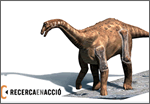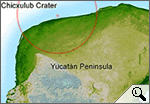|
|
|
|
 |
 |
 > A crater measuring 180 km across > Rejected theories > 'The Pyrenees during the era of the dinosaurs' dimarts, 16 de març de 2010
For some time, experts have been debating what caused the extinction of the dinosaurs, the giant reptiles that disappeared from the face of the Earth about 65 million years ago, between the Mesozoic and Cenozoic eras.
However, an international research group made up of some 40 scientists has just given its strong backing to a theory that emerged about 30 years ago: that the dinosaurs were wiped out by the impact of a meteorite hitting the Earth's surface. The group has examined data gathered over the last 20 years and its conclusions were published in the prestigious US magazine, Science, on 5 March. An asteroid with a diameter of 10 to 15 km hit Chicxulub, on the Yucatán Peninsula in Mexico. The colossal asteroid hit the Earth at enormous speed, with catastrophic results: the extinction of more than half of all the species that inhabited the Earth, including the dinosaurs. A crater measuring 180 km acrossAccording to the study published in Science, the asteroid's impact produced a phenomenal amount of energy, a billion times greater than the energy released by the atomic bombs dropped on Hiroshima and Nagasaki during the Second World War. The explosion caused landslides, gigantic tsunamis and earthquakes measuring more than 11 on the Richter scale. The mark left by the impact can still be seen today: the 180 km-wide Chicxulub Crater, located underneath the Yucatán Peninsula.
Rejected theories
+ Dinosaurs became extinct 65 million years ago.
The study published by Science rules out other theories about the extinction of the dinosaurs. One of the most widespread (although not as well-known as the asteroid theory) is that the extinction was caused by extreme volcanic activity on what is today the Deccan Plateau in India (the lava emitted by the volcanoes would have been enough to fill the Black Sea twice over). Another theory suggests that the dinosaurs were wiped out by a series of meteorites, not just one.
'The Pyrenees during the era of the dinosaurs'
+ Recerca en Acció provides information on dinosaurs.
However, regardless of the theories, what we do know is that the dinosaurs became extinct 65 million years ago. If you are interested in finding out more about dinosaurs and, in particular, those that lived in the Pyrenees, have a look at the 'Fa 65 milions d'anys. El Pirineu a l'era dels dinosaures' ('Sixty-five million years ago. The Pyrenees during the era of the dinosaurs') project organised by Recerca en Acció (Research in Action). The project, carried out last year, consisted of following up the studies undertaken at the Fumanya site (Fígols, Berguedà), where coal mining has uncovered more than 3,500 dinosaur footprints.
|
Investiga

> L'asteroide que va fer desaparèixer els dinosaures: vídeo.

> Cràter de Chicxulub: la petja de l'asteroide.

> La Terra: una història de 4.500 milions d'anys.

> Qüestionari sobre dinosaures.
I també...
- Evolució dels continents durant aquests últims sis-cents milions anys: interactiu.
- Les deu grans explosions de totes les èpoques.
- El color dels dinosaures.
Portada |
Europa Press |
El Punt |
La premsa |
Especials |
Diari de l'escola |
LesFinances.info |
Editorials |
Mail obert |
Els blocs |
Lletres
Tecnologia i ciència | Solidaritat | Cap de 7mana | Campus | El 9 | Presència | Fòrums | Enquestes | Xat | Correu
Traductor | Edicions en Pdf | Wap-pda | Biblioteca | Lletra més grossa
Tecnologia i ciència | Solidaritat | Cap de 7mana | Campus | El 9 | Presència | Fòrums | Enquestes | Xat | Correu
Traductor | Edicions en Pdf | Wap-pda | Biblioteca | Lletra més grossa
| Què és VilaWeb? Publicitat Mapa web Contacte | Una web de Partal, Maresma i Associats, S.L. |


